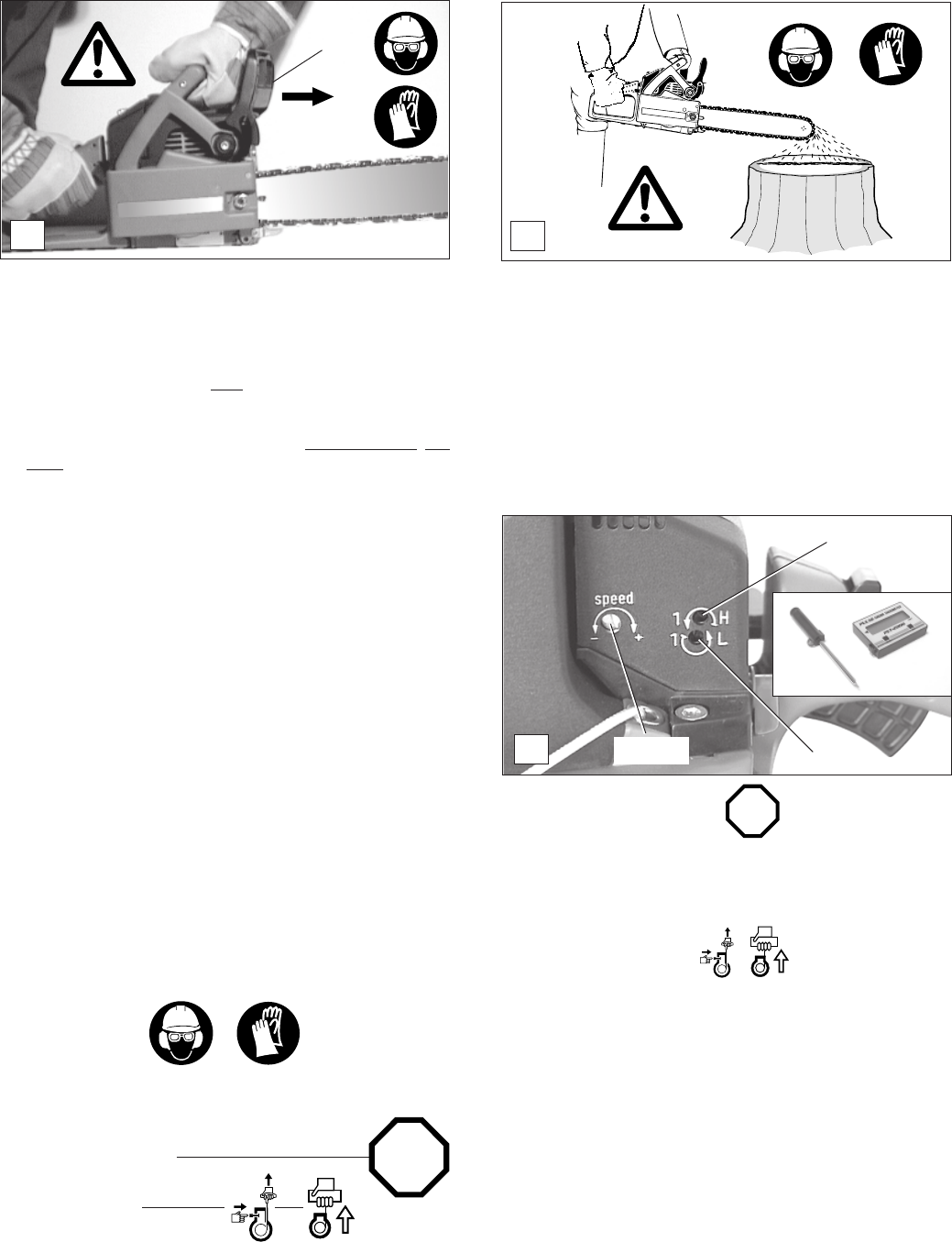
23
Checking the chain lubrication
N
Never work with the chain saw withoute sufficient chain lubrica-
tion. Otherwise the service life of the chain and guide bar will be
reduced.
Before starting work check the oil level in the tank and the oil feed.
Check the oil feed rate as described below:
- Start the chain saw.
- Hold the running chain saw approx. 15 cm above a trunk or
the ground (use an appropriate base).
If the lubrication is sufficient, you will see a light oil trace because
oil will be flung off the sawing device.
M
Checking the safety chain brake
Do not work with the saw without first checking the chain
brake!
- Start the engine as described (make sure you have a good
footing, and place the saw on the ground in such a way that
the blade is free of contact).
- Grasp the tubular handle firmly with one hand and hold the
grip with the other.
- With the engine running at moderate speed, press the hand
guard (C/1) in the direction of the arrow with the back of your
hand until the chain brake engages. The chain should stop
immediately.
- Immediately release the throttle and release the chain
brake.
IMPORTANT: If the chain does not stop immediately when
you test the chain brake, do NOT use the saw! Take the saw
to a MAKITA service center.
CAUTION:
Optimum perfornance can only be achieved if the carbure-
tor is adjusted correctly. For this work, which should be
carried out by an expert, the engine must be warmed up for
a period of 3-5 min. and the air filter must be clean.
The carburetor has been adjusted by MAKITA on the basis of
atmosheric pressure conditions at sea level. Other atmospher-
ic pressure conditions or the running-in process of a new
engine may require readjustment of the carburetor.
It is urgently recommended to use a revolution indicator (O/1)
(order number 950 233 210) in order to achieve a correct
adjustment of the carburetor. Adjust the carburetor using a 4
mm screwdriver.
The screwdriver shown (O/2) (order number 944 340 001) has
a molded-on lug to assist in adjustment.
For adjusting the carburetor correctly the following steps
must be carried out:
1. Warm up engine
2. Switch off engine
3. Basic adjustment
4. Start engine
5. Set idle speed
6. Adjust speed
7. Check idling speed
8. Check acceleration
9. Check max. speed or output
10. Repeat adjustment procedure starting with step 5, until
idling speed, max. speed and acceleration are reached
with the adjustment made.
STOP
1
2
3
4
speed
O
1
2
6
Adjusting the carburetor
Basic adjustment (step 3)
- First, carefully turn the 2 adjusting screws for the main jet
(O/3) and the idle jet (O/4) to the right (clockwise) until you
feel them stop.
- Now turn both screws one turn to the left (counter-clockwise).
Set idle speed (step 5)
- If the chain turns when the engine is idling, unscrew the
throttle-valve stop screw (O/speed) until the chain stops. If
the engine runs unevenly, screw the screw (O/speed) back
in.
- Idling speed should be 2,600 rpm.
Adjust speed (output) (step 6)
- Adjust the speed by adjusting the main jet screw (O/3) to
11,500 rpm (DCS 340, 341), 12,000 rpm (DCS 400, 401).
Check idle speed (item 7)
- After having adjusted the max. speed ensure the idle speed
is set to 2,600 1rpm. (the chain must not turn). Use the idle
jet screw (O/4) to regulate it. Turn in the screw (O/4) to speed
up, and turn out the screw (O/4) to speed down the engine.
Check acceleration (item 8)
- Now check the acceleration, i. e. the time necessary for
speeding up from idle speed to max. speed. To do this,
press the throttle lever hard.
- If the acceleration is too low, turn out the idle jet screw
(O/4) approx. 1/8 rotation.
Do not run the engine without load a high speed, open
throttle fully only, if you are sawing!
STOP
1
2


















